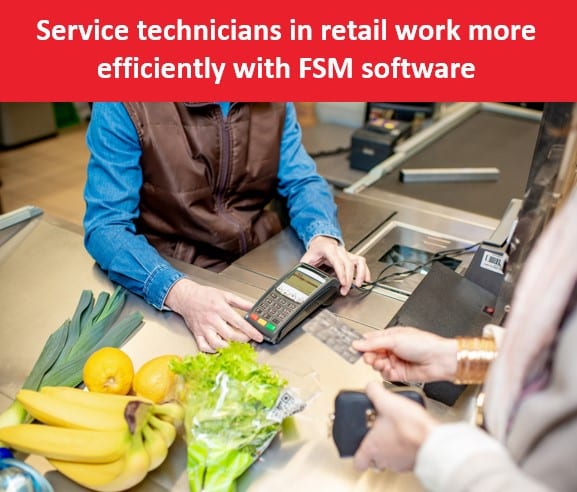
- Gestion d’interventions
- Maintenance
- preventive maintenance
- retail
- Work Order Management
How Service Technicians in Retail Store Maintenance are Working More Efficiently
Key Takeaways
Retail maintenance technicians support critical systems that keep stores running and customers satisfied. Here’s how efficiency is improving across the industry:
- Technicians work on various assignments in HVAC, refrigeration, kiosks, etc.
- FSM software automates work orders, scheduling, and dispatching of technicians.
- Preventive maintenance minimizes the downtime of equipment and expensive repairs.
- Seasonal planning keeps the stores prepared in high-traffic seasons.
- Whether in-house or outsourced, a formal maintenance plan is necessary.
Technicians in the retail industry provide a variety of services and work with a variety of equipment types. From cleaning and sanitizing food areas to fixing defective cash registers, self-serve kiosks, HVAC/ refrigeration and electrical systems, there is never a shortage of maintenance work to be done.
Take one-stop-shop mega stores like Costco and Walmart for example, that need to maintain 3000 pieces of equipment under one roof at times. It’s essential for technicians in this industry to have the knowledge and versatility to work with different systems every day.
Although retail store maintenance teams operate completely behind the scenes, they play an extremely important role that impacts customer satisfaction. In fact, the relationship between retail maintenance services and the customer experience is very closely linked. A recent survey conducted in the US, reveals why customers choose to shop at certain grocery stores, over others.
While a wonky wheel on a shopping cart can put a damper on the experience, a computer bug during checkout can have shoppers vowing to take their business elsewhere for good. Losses for the retail store can be even greater if, perish the thought, fridges or freezers fail and tons of food items spoil because of it.
What Challenges Do Retailers Face in Store Maintenance?
Retail store maintenance includes several particular challenges. For instance, store management must attend to customer service while ensuring that all sorts of equipment are well managed so that the stores are always open and presentable. Some problems are defective heating and cooling systems, issues with self-service check-in terminals, and occasional plumbing troubles.
A challenge that service technicians encounter is that diagnosing problems is usually time-consuming because of the many types of equipment on the market. Also, it takes work to organize the job with several vendors for specific services to be repaired simultaneously. A detailed retail store maintenance checklist is necessary to address these issues holistically so that no part of the store remains unaccount, including the customer-facing areas and the operational zones.
Field service management software like Praxedo can make such activities more efficient by scheduling and updating the status of field technicians and equipment vendors.
Why is field service software essential in retail maintenance?
To ensure they can keep up with all of the work that needs to be done to satisfy their clients, the retail industry is using field service software for work order management.
WORK ORDER MANAGEMENT
When you have multiple technicians working on various pieces of equipment, at different store locations, for example, coordinating information becomes impossible without field service management (FSM) software. Think of it as a central hub that allows both field service technicians and field service managers at the main office to access the data 24/7, from any device.
SCHEDULING
If a self-serve kiosk at Walmart breaks down, a reliable field service management tool is required to find the closest technician to the store, with the right skill set, and dispatch them promptly. FSM software with advanced scheduling capabilities allows managers or field service dispatchers to identify their various technicians and their current locations on a map. In fact, Praxedo’s algorithm-based engine is smart enough to calculate distances between job sites, so that technicians get to the problem as fast as possible. Allocating spare parts and assigning them to work orders is also done in a couple of clicks. With optimized field service scheduling, the perfect workday is always possible.
RECURRING JOBS
Most of the servicing done for retail stores is recurring work. Equipment such as freezers that store food need to be running continuously without a hitch. Lighting and electrical panels can’t stall or be the cause of safety issues. The goal is to keep operations smooth so that shoppers are always satisfied while in store.
Why is preventative maintenance important in retail?
FSM plumber software like Praxedo allows stores to run efficiently and helps technicians stay productive. With all the various operational activities and equipment to be serviced in a day, work can be planned, tracked and better managed all year round. Managers gain insight into spending and make more informed business decisions when it comes to cutting down on costs.
With a field service mobile app, technicians can easily access information and document all their activities in one place. This may include before and after images of the equipment being serviced, or accessing instruction manuals critical to a particular job such as handling electrical control panels.
The Importance of Preventative Maintenance in Retail
The importance of store maintenance in retail cannot be overstated. Preventative maintenance means periodically checking the machines to avoid a breakdown to keep providing customers with a smooth shopping experience. Maintenance of equipment, including cash registers and refrigerators improves efficiency by reducing the frequency of breakdowns.
Maintenance technicians can handle minor problems that may arise before they become significant. Yet, it is advisable to adopt a professional retail store maintenance program focused on damage prevention to store assets; this way, less money gets spent on repair bills, and the stores’ assets will last longer.
A great example of proactive field service management is conducting regular system checks on HVAC units to prevent breakdowns during peak shopping periods, as well as timely servicing of refrigeration equipment to ensure perishables remain fresh.
This not only reduces costs by avoiding expensive repairs and product loss but also ensures a seamless shopping experience, which is crucial for customer satisfaction. Mobile applications like Praxedo streamline this process by offering features such as preventative maintenance scheduling, service history tracking, and automated reminders, ensuring all necessary checks are performed on time.
Should retail stores keep maintenance in-house or outsource it?
To ensure the highest service quality, retail stores typically rely on in-house retail store maintenance teams to handle their basic equipment, and leave the heavy-duty jobs to the manufacturers’ service providers.
Chain stores, particularly those in the fashion industry, employ their own chain store maintenance teams to support their various sales locations, or they rely on service companies with a national presence. Those located in a shopping mall may share a common service provider with other stores beside them.
The retail industry is a dynamic sector that relies heavily on a variety of vendors to deliver goods and services. One area that stands out in particular is facilities maintenance. Ensuring a safe, well-maintained environment in a retail space is crucial to providing a positive customer experience. It often involves juggling multiple vendor contracts and effectively managing a continuous stream of work orders, both routine and emergency, to keep stores located across various regions running smoothly.
Retail facilities encompass various types of retail stores, from fashion boutiques to large supermarkets. Each retail store has its unique maintenance needs. For instance, a clothing store may require periodic updates to display units and fitting rooms, while a grocery store would have routine refrigeration maintenance and sanitary inspections. Consequently, prevenattive maintenance plays an integral part in ensuring the longevity and functionality of these retail spaces.
A comprehensive facilities maintenance program can help coordinate all these different requirements. Facility management teams work hard to develop a maintenance schedule that not only addresses ongoing needs but also anticipates potential problems. This could involve daily checks of critical equipment like cash registers or HVAC systems, as well as regular deep-cleaning of the retail space to maintain the highest level of service.
Having an efficient store maintenance team is essential in delivering such a program. They are the front line in ensuring that the retail facilities are in top condition and any issues are swiftly addressed. They play a significant role in enhancing the overall customer experience, as a well-maintained store is more likely to attract and retain customers.
Ultimately, maintenance challenges in the retail industry can be effectively managed through well-structured maintenance programs, effective facility management, and a responsive shop maintenance team. These components work in harmony to ensure a superior level of service and a seamless customer experience in the retail environment.
The short answer: it depends.
The decision to handle maintenance in-house with their own retail store maintenance team or outsource it depends on the size of the store, the target market, hours of operation, and location. A retailer selling frozen food doesn’t face the same challenges as a shoe store for example. Similarly, a one-stop shop doesn’t deal with the same equipment problems as a do-it-yourself (DIY) store. Large stores like Walmart tend to do a bit of both.
What types of maintenance are needed in retail stores?
- Plumbing
- Janitorial services
- Cash registers
- Refrigeration
- Electrical systems
- Lighting
- Security cameras
- HVAC equipment
- Escalators or elevators
- Self-serve kiosks
Being proactive about maintenance is key
The last thing you want is a critical system breaking down without warning while shoppers shop. Customers expect an elevated in-store experience. This means cash registers working when shoppers are ready to pay, and meticulously disinfected areas and floors in the food aisle without fail. The best way to stay on top of these retail maintenance services is with a recurring plan in place.
The retail industry keeps things running continuously with proactive maintenance activities, designed to help service organizations take control of their operations. With FSM HVAC dispatch software, you can schedule maintenance work in advance to limit costly, emergency repairs. All data is traceable and work order management history will always be available for future reference, so technicians have the information they need to diagnose potential problems before they happen.
How should retailers handle seasonal maintenance challenges?
Seasonal changes significantly impact store maintenance in the retail industry. During colder months, heating systems require more frequent inspections to ensure an optimal shopping environment. Service technicians must keep heating units in top condition to prevent service disruptions. Conversely, in summer, air conditioning and refrigeration systems demand greater attention to maintain comfortable temperatures and preserve perishable goods.
In addition to equipment needs, factors like fluctuating foot traffic, congestion, and varying sales rates also shift with the seasons. Retail store maintenance plans should adapt accordingly, incorporating these seasonal variations to ensure efficient store operations year-round.
Some planning activities involve conducting periodic maintenance before the busy seasons, ensuring that spare parts are available in sufficient quantities, and preparing for contingencies in case of equipment breakdowns.
This practice helps monitor the performance of all systems throughout the year, thus enhancing the customer experience and minimizing any major disruptions of store operations. Field service management software such as Praxedo can assist in such seasonal maintenance schedules by reminding users of the tasks that are required to be done in any given season.
Better plan for busy shopping periods
With the holidays only a couple of months away, store operators are making sure to schedule recurring store maintenance way before the rush. Doing so will lengthen the life cycle of their assets and create great shopping experiences for all.
Conclusion
Retail store maintenance may operate behind the scenes, but its impact is visible in every smooth checkout, every well-lit aisle, and every functioning freezer. As retailers continue to expand and customer expectations rise, the need for efficient, proactive, and well-coordinated maintenance grows even more critical.
Technicians play a pivotal role in maintaining operational uptime, safeguarding perishable goods, and ensuring a safe, pleasant shopping environment. By leveraging field service management software, retail teams can streamline recurring tasks, respond quickly to emergencies, and stay ahead of seasonal maintenance needs.
Whether maintenance is handled in-house or outsourced, success depends on having the right systems, tools, and strategy in place.
Take control of your retail operations with smarter maintenance planning and the right field service technology.
With the increasing complexity of retail operations, it is no longer a matter of repairing what has gone wrong, but rather a matter of avoiding breakdowns in the first place. Field service software also allows maintenance teams to become organized, respond quickly, and ensure equipment is in the best condition across various locations.
The bottom line of it all is this: it is the silent, behind-the-scenes effectiveness that keeps stores open, customers satisfied, and business moving along.
Do you want to streamline your retail maintenance activities? Try intelligent scheduling using field service software such as Praxedo.
Frequently Asked Questions (FAQs)
1. Why is preventive maintenance important?
Preventive maintenance prevents sudden failures in the retail setting. Technicians can also prevent large problems by checking systems such as refrigeration, HVAC, and self-serve kiosks regularly to repair minor problems. This maintains stores in good condition, and customers enjoy shopping.
2. What is preventive predictive maintenance?
Preventive predictive maintenance is a combination of scheduled and real-time data insights. In retail, this would be the ability to monitor equipment performance and predict failures before they occur, such as a compressor that is wearing out before it causes cold storage to fail.
3. What are the benefits of field service software in retail maintenance?
Field service management software enables store operators to schedule, assign, and track maintenance work more effectively. It assists in sending the correct technician to the correct store, maintains records in order, and makes sure that recurring tasks such as freezer checks or HVAC inspections are never forgotten.
4. What types of maintenance are most critical in retail stores?
Refrigeration systems, cash registers, HVAC units, and self-serve kiosks are the most important maintenance activities in retail. These have a direct effect on the operations of the stores and customer experience. Failure of any of these systems may result in loss of products, safety hazards, or delays in checking out.
Our similar articles.
-
- Field Service Management
- Work Order Management
- Mobile App
- Field Service Software
Why service companies need to focus on the big picture rather than the smaller details
August 15, 2022 -
- Technician
- Productivity
- Work Order Management
- Gestion d’interventions
Maximize your field service team’s efficiency with our tips to improve technician productivity
May 17, 2018 -
- Software
- Work Order Management
The 3 Things You Should be Doing if You’re a Field Service Company.
August 19, 2021


